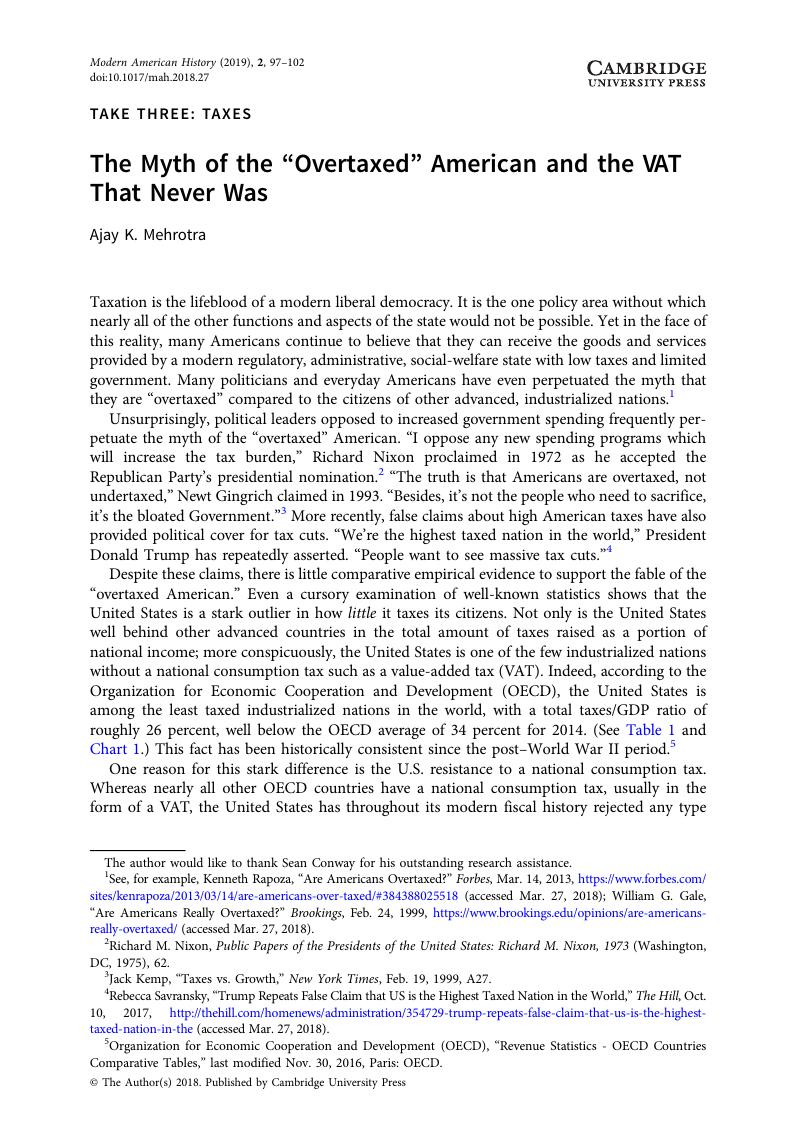Article contents
The Myth of the “Overtaxed” American and the VAT That Never Was
Published online by Cambridge University Press: 28 September 2018
Abstract

Keywords
- Type
- Take Three: Taxes
- Information
- Copyright
- Copyright © The Author(s) 2018. Published by Cambridge University Press
Footnotes
The author would like to thank Sean Conway for his outstanding research assistance.
References
1 See, for example, Kenneth Rapoza, “Are Americans Overtaxed?” Forbes, Mar. 14, 2013, https://www.forbes.com/sites/kenrapoza/2013/03/14/are-americans-over-taxed/#384388025518 (accessed Mar. 27, 2018); William G. Gale, “Are Americans Really Overtaxed?” Brookings, Feb. 24, 1999, https://www.brookings.edu/opinions/are-americans-really-overtaxed/ (accessed Mar. 27, 2018).
2 Nixon, Richard M., Public Papers of the Presidents of the United States: Richard M. Nixon, 1973 (Washington, DC, 1975), 62Google Scholar.
3 Jack Kemp, “Taxes vs. Growth,” New York Times, Feb. 19, 1999, A27.
4 Rebecca Savransky, “Trump Repeats False Claim that US is the Highest Taxed Nation in the World,” The Hill, Oct. 10, 2017, http://thehill.com/homenews/administration/354729-trump-repeats-false-claim-that-us-is-the-highest-taxed-nation-in-the (accessed Mar. 27, 2018).
5 Organization for Economic Cooperation and Development (OECD), “Revenue Statistics - OECD Countries Comparative Tables,” last modified Nov. 30, 2016, Paris: OECD.
6 Ibid.
7 Bender, Thomas, ed., Rethinking American History in a Global Age (Berkeley, CA, 2002)CrossRefGoogle Scholar; Hodgson, Godfrey, The Myth of American Exceptionalism (New Haven, CT, 2009)Google Scholar.
8 Kato, Junko, Regressive Taxation and the Welfare State: Path Dependence and Policy Diffusion (Cambridge, UK, 2010)Google Scholar. In this sense, the central question of “Why no VAT in the U.S.?” may be a subset of the classic Werner Sombart question, “Why no socialism in the U.S.?” Sombart, Werner, Why Is There No Socialism in the United States?, trans. Hocking, Patricia M. and Husbands, C. T. (1906; White Plains, NY, 1976)CrossRefGoogle Scholar.
9 Jan M. Rosen, “Tax Watch; The Likely Forms of New Taxes,” New York Times, Dec. 19, 1988, D2; Robert J. Barro, “The Coming Crises of Governments,” Financial Times, Aug. 3, 2011, 9. Summers is purported to have said that a U.S. VAT will be possible only when these two political opponents swap views—that is, only when liberals realize that a VAT can be a money machine and conservatives realize its economic incidence is regressive; See Rose, “Tax Watch.”
10 Pierson, Paul, Politics in Time: History, Institutions, and Social Analysis (Princeton, NJ, 2004)CrossRefGoogle Scholar; James, Kathryn, The Rise of the Value-Added Tax (New York, 2015)CrossRefGoogle Scholar.
11 Kennedy, David M., Over Here: The First World War and American Society (New York, 1980)Google Scholar; Capozzola, Christopher, Uncle Sam Wants You: World War I and the Making of the Modern American Citizen (Oxford, UK, 2010)Google Scholar.
12 Mehrotra, Ajay K., Making the Modern American Fiscal State: Law, Politics, and the Rise of Progressive Taxation, 1879–1929 (Cambridge, UK, 2013)CrossRefGoogle Scholar.
13 Brownlee, W. Elliot, Progressivism and Economic Growth: The Wisconsin Income Tax, 1911–1929 (Port Washington, NY, 1974)Google Scholar; Graetz, Michael J. and O'Hear, Michael M., “The ‘Original Intent’ of U.S. International Taxation,” Duke Law Journal 46, no. 5 (1997): 1020–109CrossRefGoogle Scholar.
14 Adams, Thomas S., “Fundamental Problems of Federal Income Taxation,” Quarterly Journal of Economics 35, no. 4 (Aug. 1921): 527–56CrossRefGoogle Scholar.
15 Ibid., 553. It is one of the interesting ironies of history that an American political economist was one of the intellectual originators of a levy that the United States continues to reject.
16 Ibid., 554.
17 Thorndike, Joseph J., Their Fair Share: Taxing the Rich in the Age of FDR (Washington, DC, 2013)Google Scholar; Zelenak, Lawrence, Learning to Love Form 1040: Two Cheers for the Return-Based Mass Income Tax (Chicago, 2013)CrossRefGoogle Scholar.
18 Martin, Isaac William, The Permanent Tax Revolt: How the Property Tax Transformed American Politics (Stanford, CA, 2008)Google Scholar; Kato, Regressive Taxation and the Welfare State.
19 Graetz, Michael J., 100 Million Unnecessary Returns: A Simple, Fair, and Competitive Tax Plan for the United States (New Haven, CT, 2008), 72CrossRefGoogle Scholar.
20 Savransky, “Trump Repeats False Claim.”
- 1
- Cited by


